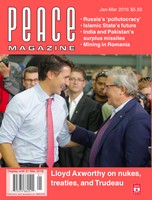
Peace Magazine Jan-Mar 2016, page 30. Some rights reserved.
Search for other articles by Ken Simons here
By Douglas Roche. Toronto: Lorimer, 2015
The year 2015 marked the 70th anniversary of the end of the Second World War, but also of the creation of the United Nations. The prolific Douglas Roche has written a concise (94 pages) overview of the UN’s strengths and failures over the past 70 years—and why it continues to be desperately needed.
“What holds back the UN is the constant militarism driving the policies of almost all states,” writes Roche, a former Canadian Ambassador for Disarmament to the UN. As a result, we see undeclared wars against non-state actors—as with the current bombing campaign against Daesh in Syria and Iraq—rather than the support of “humanitarian containment” and civilian protection through UN peacekeeping.
Roche notes that the UN is the most successful global treaty or body to date, easily topping the Thirty Years’ Peace (446 bc), the Peace of Westphalia (1648), and the League of Nations (1919). It has a much broader mandate than any of its predecessors, encompassing everything from civil aviation to infant health to individual and collective human rights.
In a chapter on UN Resolution 1325, which was passed in 2000 and codifies the rights of women to peace and security, Roche notes that
“Resolution 1325 is a perfect example of what the UN is all about: challenging the discriminations against half of humanity, holding up a vision of social justice, recognizing the obstacles that block progess, and renewing determination to overcome failures in moving humanity forward.”
Roche concludes with an impassioned call for the UN to promote and build a culture of peace—not just as a well-meaning gesture, but as the best long-term response to the threats of militarism and social exclusion.
_ Reviewed by_ Peace managing editor Ken Simons.

Peace Magazine Jan-Mar 2016, page 30. Some rights reserved.
Search for other articles by Ken Simons here